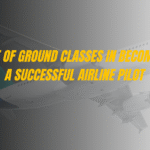
A career as a cargo pilot can be an exciting and rewarding journey for those who are passionate about aviation and logistics. Cargo pilots play a crucial role in the global supply chain, ensuring that goods—from food to electronics—are transported safely and on time. Unlike commercial passenger flights, cargo pilots focus solely on transporting goods, which means their career path may differ slightly from that of a passenger pilot. In this article, we’ll explore the career path of a cargo pilot, including the necessary qualifications, skills, training, and potential job opportunities.
Understanding the Role of a Cargo Pilot
Cargo pilots, also known as freight pilots or air cargo pilots, are responsible for flying aircraft that transport goods rather than passengers. These goods could include a variety of items such as perishable food, medical supplies, machinery, and even live animals. The work involves operating large cargo planes, managing safety procedures, and coordinating with ground crews to ensure timely and accurate deliveries.
Cargo pilots are employed by companies that specialise in freight transportation, such as FedEx, UPS, DHL, and other air cargo carriers. They can also work for commercial airlines that operate cargo services alongside passenger flights. The job of a cargo pilot can be challenging, requiring not only excellent flying skills but also a keen understanding of logistics, time management, and the ability to adapt to different flight conditions.
Educational Requirements for Becoming a Cargo Pilot
The journey to becoming a cargo pilot usually starts with a solid educational foundation. While there is no specific degree requirement to become a cargo pilot, many aspiring pilots choose to pursue a degree in aviation, aeronautical engineering, or a related field. This helps them understand the technical aspects of flight operations and aviation safety.
Here are some common educational steps that aspiring cargo pilots take:
- High School Education: A high school diploma or equivalent is the first step. Courses in math, physics, and science can be particularly helpful in developing the analytical skills needed for an aviation career.
- Bachelor’s Degree (Optional): While not mandatory, many cargo pilots pursue a bachelor’s degree in aviation, aeronautical engineering, or other related fields. This can provide a deeper understanding of flight mechanics, air traffic control, and aviation technology.
- Flight Training: The most important part of the educational process for becoming a cargo pilot is flight training. Aspiring pilots must enroll in a flight school that offers both theoretical and practical instruction in aviation. Flight schools typically offer programs that lead to various pilot licenses.
Pilot Licenses and Certifications
One of the most critical steps on the career path of a cargo pilot is obtaining the necessary pilot licenses and certifications. These licenses not only prove a pilot’s ability to fly an aircraft but also demonstrate that they meet the rigorous safety standards set by aviation authorities.
Here are the key licenses and certifications that cargo pilots need to pursue
- Private Pilot License (PPL): This is the first step for anyone pursuing an aviation career. The PPL allows you to fly an aircraft for personal purposes, but not for commercial use. Training for this license involves both classroom instruction and practical flight hours.
- Commercial Pilot License (CPL): After obtaining the PPL, aspiring cargo pilots will need to earn a Commercial Pilot License (CPL). This license permits the pilot to fly commercially, but it still limits the scope of their operations, and they cannot yet fly cargo aircraft.
- Instrument Rating: Cargo pilots often fly in challenging weather conditions, so obtaining an instrument rating is a must. This certification allows pilots to fly based on instruments alone, which is essential when visibility is poor or weather conditions are unfavourable.
- Airline Transport Pilot License (ATPL): The highest level of pilot certification, the ATPL is required for pilots who wish to operate large commercial aircraft, including cargo planes. To earn this license, a pilot must accumulate a significant number of flight hours and pass a series of written and practical exams. It’s the most essential license for a cargo pilot who plans to operate aircraft like the Boeing 747 or Airbus A330, which are commonly used for long-haul cargo flights.
- Type Ratings: Some cargo aircraft require specific type ratings. A type rating is a certification that allows a pilot to fly a particular model of aircraft. Pilots need to complete training specific to the aircraft they intend to fly, which typically includes simulator sessions and additional flight hours.
Building Flight Hours and Gaining Experience
In the aviation world, flight hours are crucial. Pilots must accumulate a certain number of flight hours before they can qualify for higher certifications or specific jobs. Cargo pilots, like all pilots, need to gain experience and build their flight hours through a combination of personal flying, flight school training, and professional work.
Here’s how aspiring cargo pilots typically gain flight hours:
- Flight Instructor: Many pilots work as flight instructors to build their flight hours. This allows them to earn money while gaining valuable experience.
- Charter or Small Aircraft Operations: Before moving on to flying large cargo planes, many pilots work for small charter companies or regional airlines. This helps them build their flight hours while flying smaller aircraft, which can be a stepping stone to a career in cargo aviation.
- Regional or Commuter Airlines: Many cargo pilots start their careers with regional airlines that operate smaller aircraft on short-haul routes. This provides valuable experience flying in commercial operations, which can then lead to opportunities with cargo airlines.
Finding Employment as a Cargo Pilot
Once a pilot has obtained the necessary certifications and flight experience, they can begin seeking Employment as a cargo pilot. The largest employers of cargo pilots are major freight companies such as FedEx, UPS, and DHL. These companies operate fleets of cargo aircraft and are always looking for qualified pilots to transport goods across the globe.
Here’s a breakdown of where cargo pilots typically find work:
- Freight Companies: Major global companies such as FedEx and UPS hire a significant number of cargo pilots. These companies offer excellent salaries, benefits, and opportunities for career growth.
- Airlines with Cargo Operations: Some airlines, such as Delta and American Airlines, operate dedicated cargo divisions alongside their passenger services. Cargo pilots working for these airlines often have a similar role to passenger pilots but focus entirely on transporting goods.
- Cargo Charter Companies: Some pilots work for smaller cargo charter companies that offer customised freight services. These pilots often operate smaller aircraft and may work on short notice, providing more variety in their daily routine.
- Government and Military Cargo Operations: Some cargo pilots work for government agencies or the military, transporting supplies, humanitarian aid, or equipment for defence purposes.
Salary and Benefits of Cargo Pilots
The salary of a cargo pilot can vary based on factors such as experience, the size of the aircraft they are flying, and the company they work for. On average, cargo pilots earn between $70,000 $150,000 annually, with senior pilots and those flying larger aircraft earning higher salaries.
Additionally, cargo pilots often receive attractive benefits, including health insurance, retirement plans, and travel perks. Many freight companies also offer excellent job security, as the demand for air cargo services continues to grow with the increasing volume of global trade.
The Lifestyle of a Cargo Pilot
The lifestyle of a cargo pilot can differ from that of a commercial passenger pilot. While commercial pilots often have regular schedules and predictable routes, cargo pilots may have more flexible hours, with overnight and long-haul flights being common. Cargo pilots may also spend significant amounts of time away from home, depending on the nature of their routes and the destinations they serve.
This aspect of the job can be both rewarding and challenging. Some pilots appreciate the flexibility and travel opportunities, while others may find the time away from family and friends to be a downside.
Advancement Opportunities for Cargo Pilots
Cargo pilots, like commercial pilots, have the opportunity to advance in their careers over time. Advancement is typically based on a pilot’s experience, performance, and the number of flight hours they’ve accumulated.
Here are some potential career advancements:
- Captain: As a cargo pilot gains more experience, they may be promoted from first officer (co-pilot) to captain. This position involves greater responsibility and leadership, as the captain is in charge of the flight crew and overall flight operations.
- Training or Safety Officer: Experienced cargo pilots may move into training roles, teaching new pilots or ensuring that the airline’s safety standards are met. These positions can involve more office-based work, but they still require strong aviation expertise.
- Fleet Manager or Operations Manager: Some pilots move into management positions, overseeing a fleet of aircraft or coordinating flight operations. These roles often involve a combination of logistics, planning, and leadership skills.
The Future of the Cargo Pilot Career
The future of the cargo pilot career is promising, thanks in part to the ever-increasing demand for air cargo services. Global trade and e-commerce have grown rapidly, and the need for fast, efficient delivery of goods continues to drive the need for air freight.
Moreover, advancements in aviation technology, such as the development of unmanned aerial vehicles (UAVs) or drones, could impact the industry. While this may change some aspects of the profession, the demand for experienced human pilots to operate cargo planes will likely remain strong for many years to come.
Conclusion
Becoming a cargo pilot is an exciting career path for those passionate about aviation and logistics. With the right education, flight training, and certifications, aspiring pilots can embark on a rewarding journey, working for top cargo carriers and enjoying competitive salaries and job stability. While the job can be demanding, with long hours and frequent travel, it offers numerous opportunities for advancement and personal fulfilment. As global trade continues to grow, the role of cargo pilots will remain essential in ensuring that goods are delivered safely and efficiently around the world.
If you’re considering a career as a cargo pilot, now is a great time to start training and taking the necessary steps toward making this dream a reality. For expert guidance and top-tier flight training, Top Crew Aviation, a leading aviation institute, can help you develop the skills and qualifications needed for a successful career as a cargo pilot. Get in touch with Top Crew Aviation today and take the first step towards a rewarding and exciting career in the skies!
Frequently Asked Questions
No FAQs found.



